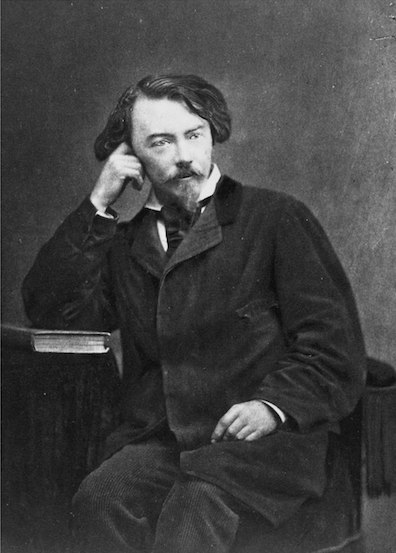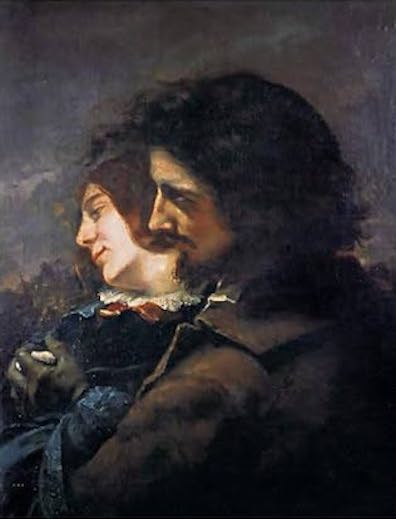Russell responds "impatiently" to Stephen's project of
connecting things in Hamlet to details of
Shakespeare's personal life: "I mean when we read the poetry
of King Lear what is it to us how the poet lived? As
for living our servants can do that for us, Villiers de l'Isle
has said." He is quoting a striking line from Axël, a
play by the French writer Auguste de Villiers de l'Isle-Adam,
about two lovers who choose joint suicide over a life lived
together.
Jean-Marie-Mathias-Philippe-Auguste, comte de Villiers de
l'Isle-Adam (1838-89), variously called Villiers, Auguste, or
Mathias by those close to him, was a minor aristocrat from
Brittany who lived in Paris from age 22 onward, often in
poverty and often frustrated in love. He idolized Charles
Baudelaire, read Edgar Allan Poe avidly, and was close friends
with Stéphane Mallarmé. His writings (poems, stories, plays, a
novel) have been described as works of late Romanticism or
early Symbolism. He prized Axël most highly of all,
and it became famous for one line: "Vivre? les
serviteurs feront cela pour nous."
Gifford summarizes the relevant details: "At the climax of
the play, Count Axel, who has 'a paleness almost radiant' and
'an expression mysterious from thought', meets Sara, a daring
beauty who has come to steal the count's hidden treasure. They
experience a lightning bolt of love at first sight and Sara
proposes that they elope to a setting where they can live a
life that will match the beauty of their love. The count
replies: 'Live? No. Our existence is full.... Sara, believe me
when I say that we have just exhausted the future. All the
realities, what will they be tomorrow in comparison with the
mirages we have just lived?... To consent, after this, to live
would be but sacrilege against ourselves. Live? our servants
will do that for us'. He proposes suicide; they share a goblet
of poison and perish in a rapturous love-death." One thinks of
late Romantics like Richard Wagner and of Symbolists like
Joris-Karl Huysmans.
Villiers worked on the play for years, and it was published
posthumously in 1890. In 1897, William Butler Yeats quoted the
line about servants doing the living as an epigraph to The
Secret Rose and dedicated the book to George Russell.
Joyce no doubt heard the flattered Russell reciting the words
on various occasions and found an apt place for them in Scylla
and Charybdis, where they hyperbolically sum up the view
of literature that Stephen is opposing. In Russell's opinion
art arises from the mystical depths of the soul, rather than
from a desiring human being's engagement with the world around
him: "The supreme question about a work of art is out of how
deep a life does it spring." It is hard to imagine Russell
opining that death is better than life, or that aristocrats
are better than servants, but the quote from Villiers does
mesh with his view that life is much more than a series of
experiences in the company of other people.

